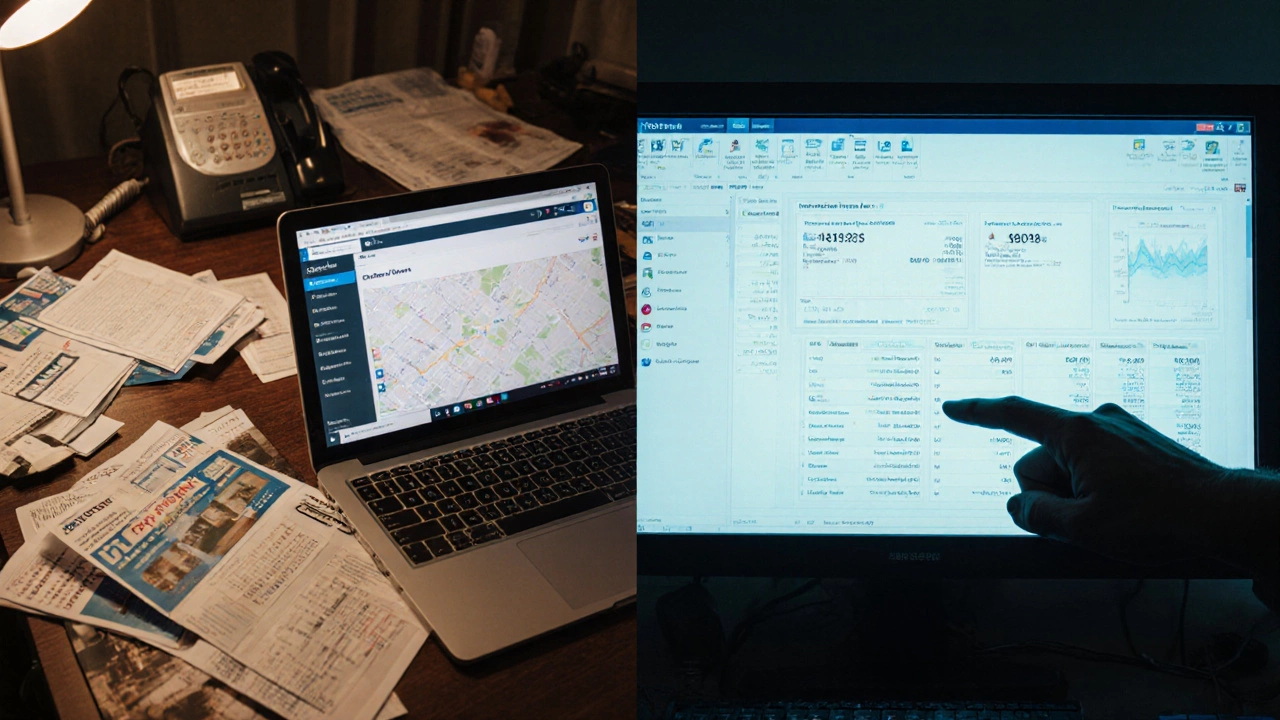Commercial Real Estate Marketplace Comparison Tool
Compare Commercial Real Estate Platforms
Find the best platform for your commercial real estate needs by comparing key features.
| Platform | Property Coverage | Data Depth | Broker Network | Analytics Tools | Best For |
|---|---|---|---|---|---|
| CoStar | 7.5M+ properties (US, CA, EU) | Sales history, tenant data, cap rates, zoning | 150,000+ verified brokers | Market reports, trend dashboards, custom alerts | Institutional investors, developers, large brokers |
| LoopNet | 1.2M+ listings (US-focused) | Basic specs, photos, contact info | Broker listings only | None | Small investors, first-time buyers |
| Crexi | 800,000+ listings (US) | Photos, price, broker contact | 50,000+ brokers | Basic filters, email alerts | Small to mid-sized brokers, local investors |
| PropertyShark | Residential + commercial (US) | Ownership records, tax data | None | Ownership history, tax info | Residential investors, tax researchers |
When you're looking to buy, sell, or lease a warehouse, office building, retail strip, or industrial park, you don't want to waste time scrolling through residential listings or calling dozens of agents. You need a single place that shows every active commercial property on the market-with verified details, sales history, tenant data, and direct access to brokers. That place isn't Zillow. It's not Realtor.com. It's CoStar.
CoStar is the undisputed leader in commercial real estate data
CoStar Group operates the largest and most comprehensive commercial real estate marketplace in the world. It doesn't just list properties. It tracks over 7.5 million commercial properties across the U.S., Canada, and Europe. That includes office spaces, retail centers, industrial facilities, multifamily buildings, hotels, and land zoned for development. Every listing is verified by licensed brokers or directly sourced from public records, property managers, and MLS systems that feed into CoStar’s network.
Unlike residential platforms that rely on agent uploads, CoStar requires brokers to update listings within 24 hours of any change-price, square footage, availability, or lease terms. If a property is sold, the sale price and date are added automatically from county deed records. This level of accuracy is why institutional investors, large developers, and Fortune 500 companies trust CoStar to make multi-million dollar decisions.
What makes CoStar different from other platforms?
Other platforms like LoopNet or Crexi offer property listings, but they’re more like directories. CoStar is a full intelligence system. Here’s how it stands out:
- Market analytics: See vacancy rates, rental trends, and absorption rates by zip code, submarket, or city. For example, you can compare industrial rent growth in Atlanta vs. Dallas over the last 18 months.
- Tenant profiles: Know who’s leasing space in a building-Walmart, FedEx, or a startup. See their lease expiration dates and expansion plans.
- Sales history: Track past transactions for any property. You can see that a 120,000 sq ft warehouse in Charlotte sold for $18.50 per sq ft in 2023, and what the cap rate was.
- Broker network: Directly contact over 150,000 commercial brokers through the platform. No more guessing who represents a property.
- Custom alerts: Get notified the moment a 50,000 sq ft flex space with 20’ clear height becomes available in your target market.
LoopNet, which CoStar acquired in 2015, still operates as a consumer-facing listing site. But behind the scenes, CoStar’s database powers nearly all major commercial real estate transactions in North America. Even if you’re using another platform, the data likely comes from CoStar.
Who uses CoStar-and why?
CoStar isn’t for casual investors. It’s built for professionals who need precision:
- Investment firms: Use it to screen portfolios, run comparative analyses, and justify acquisitions to limited partners.
- Brokers: List properties with verified data to attract serious buyers faster. Many brokers pay for CoStar Pro to access lead tools and client dashboards.
- Developers: Analyze land availability, zoning rules, and competitor activity before breaking ground.
- Corporate real estate teams: Find new headquarters or distribution centers with exact specs-clear height, loading docks, power capacity, and proximity to highways.
- Appraisers and lenders: Pull historical sales data and market comps to support valuations and loan underwriting.
A real estate analyst in Chicago told me last year that she spends 30 minutes a day on CoStar. “If I didn’t have it,” she said, “I’d be working 10 hours a day just trying to verify basic facts.”

Alternatives to CoStar-do they matter?
There are other platforms, but none match CoStar’s depth:
| Platform | Property Coverage | Data Depth | Broker Network | Analytics Tools | Best For |
|---|---|---|---|---|---|
| CoStar | 7.5M+ properties (US, CA, EU) | Sales history, tenant data, cap rates, zoning | 150,000+ verified brokers | Market reports, trend dashboards, custom alerts | Institutional investors, developers, large brokers |
| LoopNet | 1.2M+ listings (US-focused) | Basic specs, photos, contact info | Broker listings only | None | Small investors, first-time buyers |
| Crexi | 800,000+ listings (US) | Photos, price, broker contact | 50,000+ brokers | Basic filters, email alerts | Small to mid-sized brokers, local investors |
| PropertyShark | Residential + commercial (US) | Ownership records, tax data | None | Ownership history, tax info | Residential investors, tax researchers |
LoopNet and Crexi are useful for browsing listings, especially if you’re just starting out. But if you’re making a serious investment, you’re missing critical context without CoStar’s data layers. One client bought a retail center in Miami based on LoopNet’s listing-only to find out later the anchor tenant was leaving in six months. CoStar would’ve shown the lease expiration date and tenant credit score.
How much does CoStar cost?
CoStar doesn’t sell subscriptions to the public. Access is typically through a brokerage, firm, or corporate license. Individual brokers might get access as part of their firm’s subscription. Prices start around $1,500 per month for a basic professional account and can go over $5,000 for enterprise teams with multiple users and custom reporting.
For smaller investors or independent brokers, the best path is to work with a brokerage that already subscribes. Many will let you view listings and data during the due diligence phase. Some even offer free trial access for serious buyers.

Is there a free alternative?
There’s no true free alternative with CoStar’s depth. Public records like county assessor databases give you ownership and tax info-but not lease terms, tenant names, or recent sales comps. Zillow and Redfin barely cover commercial properties, and when they do, the data is outdated or incomplete.
If you’re on a tight budget, combine free tools:
- Use Zillow Commercial for basic listings
- Check county assessor websites for ownership and tax records
- Search Google Maps for property photos and nearby businesses
- Call local brokers directly-many are happy to share listings if you’re serious
But these methods take hours, and you’ll still miss the big picture-like whether the entire submarket is oversupplied or if a new highway is coming through next year.
What’s next for commercial real estate marketplaces?
CoStar is investing heavily in AI tools that predict lease renewals, flag underperforming assets, and even suggest optimal renovation timelines based on tenant turnover patterns. They’re also expanding into Europe and Asia, where commercial data has historically been fragmented.
For now, if you’re serious about commercial real estate, CoStar isn’t just the largest marketplace-it’s the only platform that gives you the full context to make confident, data-driven decisions. Everything else is just a starting point.
Is CoStar the only commercial real estate marketplace?
No, but it’s the largest and most comprehensive. Other platforms like LoopNet, Crexi, and PropertyShark offer listings, but they lack CoStar’s depth in sales history, tenant data, and market analytics. Most commercial brokers and investors rely on CoStar for accurate, verified data.
Can I use CoStar for free?
CoStar doesn’t offer free public access. It’s a subscription service typically paid by brokerages, investment firms, or corporations. Individual users can sometimes access limited data through a broker who subscribes, or during a trial period offered by some firms. There are no legitimate free versions with full data.
What’s the difference between CoStar and LoopNet?
LoopNet is a public-facing listing site that CoStar acquired in 2015. It shows property listings, but only basic details. CoStar is the underlying database that powers LoopNet and more. CoStar includes sales history, tenant names, lease expirations, market trends, and direct broker contact info-data LoopNet doesn’t provide.
Do real estate agents use CoStar?
Yes-especially commercial brokers. Over 150,000 licensed brokers in North America use CoStar to list properties, track comps, and find qualified buyers. Many firms require their agents to use it because it’s the industry standard for accurate data.
Can I find land for sale on CoStar?
Yes. CoStar includes listings for commercial land-zoned for development, retail, industrial use, or mixed-use projects. You can filter by zoning type, size, proximity to infrastructure, and recent sales of comparable parcels.

